Not to cry foul, but Dave Hixon’s office sports an alarming 41 years of detritus. Boxes of jerseys, stacks of game dvds, trophies, inspirational sayings, taped-up dollar bills won in bets with women’s basketball coach G.P. Gromacki. (“G.P.’s a big predictor,” says Hixon, smiling. “I like to set him up.”) Hixon and assistant coaches Adam Hutchinson ’93 and Aaron Toomey ’14 edge around the flotsam as best as they can, underneath a crowded gallery of action shots of Amherst teams—which have won more NESCAC titles (7) than any other team in the conference.
Hixon is married to Mandy Hixon, who recently retired as head men’s and women’s diving coach at UMass. They have two sons: one of them, Michael Hixon, won a silver medal at the 2016 Rio Olympics for diving (the synchronized 3-meter springboard). We caught up with Coach Hixon the week before the College hosts the NESCAC Semi-Finals on Feb. 24-25, when Amherst will vie against Wesleyan at 5:30 on Feb. 24. I cleared off a space, got the recorder rolling, and then took my shot.
His Dad Was Also a Coach
KW: So the first thing I want to say is my son, then 13, did your Western Mass summer basketball clinic a while back and he was fooling around, and you made him do a bunch of pushups. I just want to thank you because he totally deserved it.
DH: At camp, kids should be fooling around to a certain extent. And that’s why it’s only a few pushups and not sending him home.
KW: Your dad was a legendary coach at Andover High School. Both of you were inducted into the New England Basketball Hall of Fame. Did he ever coach you?
DH: He did. We won a state championship in 1970 in the old Boston Garden, which was every eastern Mass kid’s dream. It was wonderful.
KW: What was he like as a coach?
DH: He was a tough guy. He was particularly tough on me. A no-nonsense guy.
KW: It’s not easy to be the coach’s kid. How are you like or different than he was as a coach?
DH: I think the discipline and the taking of individual responsibility is really important. So I’m pretty hardline. Probably not as hardline today as I was even ten years ago. But as a younger coach I was. But although I had a lot of concepts in my mind from him, I tried to be my own coach. Tried to separate myself a bit. So a lot of the really good stuff that he did, I didn’t do it, even though some of the concepts were rattling around in my mind. But he’s always been a great mentor to me.
KW: Tell me about what you were like as a basketball player.
DH: I was a good defensive player. I played every minute of every game. Never took any time off. And that’s what I try to get our guys to do. I was a three-sport captain and athlete in high school, basketball, football, track. As a matter of fact, [Amherst football coach 1959-1992] Jim Ostendarp, who was probably the guy who recruited me the hardest here, recruited me for football. I just really loved to compete, loved to win, loved to lay it out there.
KW: You’ve been interviewed many times when you’ve won 400, 500, 600 games. I guess I’m the 800 person, right? Congratulations for hitting this milestone. Are you shooting for a particular number before you retire?
DH: No. I wasn’t really even shooting for 800. I’ve just been enjoying the job. I’ve turned down other situations to keep this job because I really enjoy that part of it. This is not really an end line. But it’s been great for my family and myself. And I love it. It’s awesome.
Here Come the Inspirational Quotes
KW: I see there are lots of inspirational quotes in your office. Here’s one: “Coaching is making players do what they don’t want to do so they can become the players they want to become.” Is that a quote you go with?
DH: We go with a lot of quotes. That’s part of the mission here. First of all, I’ve always looked at this as more than basketball. We try and educate young kids and make them better. And people always say to me, “Tell me about your losses.” And I say, “I don’t remember any of those really.” I wake up every now and then thinking about one, but my biggest losses have been when I haven’t been able to reach a kid. To have an effect on him as a person before he leaves here.
I read a great quote the other day that “the only long-lasting discipline is self-discipline.” You know, basketball is a sport. It’s fun. It should be. It’s a game. I think the reason schools like Amherst support sports financially to such a high level, is because of what they teach. Learning about teamwork. Responsibility.
So when kids figure that this is something greater than them and play towards that, that’s really important. And hopefully, during their career, they start to look around and say, “These other 14 guys are relying on me to do my job.” And that’s sort of become the new expression. “Do your job,” by Bill Belichick.
KW: Are there particular quotes that you deploy when needed?
DH: These placards are something that we do every year. We put them on Amherst basketball T-shirts too, so that the kids see them. So this year it’s “I will, so we can.” It’s about not diffusing responsibility. Making sure “I” do what I
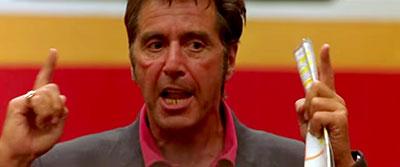
KW: I see that 2014’s saying is just “One more …” What’s the dot-dot-dot for?
DH: One more. We just won a national championship in 2013, so…
KW: It’s one more championship?
DH: And what else?
KW: I’m not sure.
DH: One more step. One more free throw. One more sprint. One more lift.
Let the Weird Questions Begin
KW: So Coach, this is going to sound kind of hokey, but I have some curveball questions for you. No, let’s do a basketball metaphor—behind-the-back-pass questions. Here’s my first: What nicknames have you had over time?
DH: Everybody has always called me Hix. In my fraternity days, they called me Rookie. I used to love The Beach Boys, and my hair is like Brian Wilson’s, so they called me Beach Boy.
KW: If Hollywood made a movie about your life, who would play you?

KW: You are now 801-287 for a 73.6 winning percentage. You are only the third coach in D3 men’s basketball history to reach 800 wins. Clearly, you have had amazing success. So: How do you define success?
DH: John Wooden did that original pyramid of success. He defined success as doing the very best that you can to become the very best you’re capable of becoming. Because you can’t judge success by the end result. And if you do, then you’ve missed all that stuff that was much more important than the end result.
Now that my son is diving in the Olympics, if he only judges success by getting a gold medal, then eight hours of training a day would become a waste of his time. You can’t do that. You have to figure out who you are and what did you get from it and the growth that happened along the way. I’m a process guy. I’m not an end result guy. I believe end results happen because of the process.
Yeah, so success will be making our kids better people. Better adults, better family people. So when I fail at that I get very introspective about what I could have done differently. Because everybody’s different. We’re finding out more and more. Some coaches are like you treat everybody the same, right? I’ve always disagreed with that. But more so today than ever, because kids are so different. Different learning styles. Motivations.
KW: Next question: What books are on your nightstand right now?
DH: The Wesleyan playbook.
KW: OK. A little light reading!
KW: What coaching books have you enjoyed over the years?
DH: Rick Pitino is so out of favor right now. But he wrote one of my favorite books, Success Is a Choice. The Talent
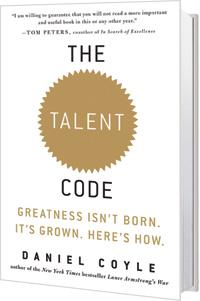
KW: What’s your favorite non-coaching book?
DH: Don Quixote. It was taught by Jim Maraniss (professor of Spanish, emeritus), which may have made it an even better book than it was, because Jim was such a wonderful teacher. And quite a character. He became a good friend of mine.
The Coach’s Undergrad Days
KW: I’m glad you brought that up because I want to ask you about your undergrad days. What did you major in?
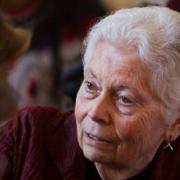
KW: Tell me a couple of highlights of your student time at Amherst.
DH: My two favorite courses were Jim Maraniss’s course on Cervantes. And then all the way to the other side of the spectrum was Math 33, which was taught by Duane Bailey, which was called the theory of numbers. I remember doing a problem in class that he asked me to get up and do. If I had a picture, it would have looked like something out of Good Will Hunting.
KW: You obviously need psychology as a coach. But math makes sense too. Are you a good stats guy?
DH: Yeah. I have a lot of numbers in my head.
KW: So when did you decide to be a coach?
DH: You know, probably like at five. But most coaching isn’t all that lucrative. And my parents paid all this money for college. Of course, back then it was $3650 a year when I was a freshman, later $4250. I was on half financial aid. For four years, I worked breakfast every morning. So, jeez, my parents paid all this tuition. Should I be chasing the money? Should I be going to Wall Street?
KW: So what did you do?
DH: I applied for the Hitchcock fellowship, a one-year fellowship here as a teaching coach. And it’s a really hard position to get. A lot of people apply for it. And I remember going into see Jim Ostendarp. I said, “Coach, I want to be a Hitchcock fellow. I want to coach. Will you support me?”
And he said, “No. I won’t. You want to coach because your dad’s a coach. End of story.” So he just basically dismissed me. And I remember leaving his office and not sleeping well that night and just really being upset about the whole conversation.
I went back in to see him the next day. And I said, “Look, Coach. I don’t care what you say. I thought about it all last night. I want to coach because I want to coach, not because my dad was a coach. I don’t care what you think about that. I’m still going for the Hitchcock fellow.” And he just got this big grin on his face and he had the coke-bottle glasses. And he looks at me and goes, “Hix, I knew that. I just wanted you to know that.” He was a wonderful man.
KW: He wanted to see how much you wanted it.
DH: That’s exactly right. So I was a Hitchcock. I was a volunteer. And then I got this job. And then my five-year plan was: Do I want to coach Division I? And at the end of my very first year I got a Division 1 assistant offer. And I had to make a decision on that and I decided I wanted to learn to coach, actually coach. Because there’s a big difference from being an assistant coach to the very first time you have to make the decisions. As opposed to suggesting decisions.
The next thing you know, five became ten. Then I had a couple of offers come and go over the years. I’m a list guy. I do one side pro, one side con.
KW: The investigative reporter in me wants to ask about the offers, but I expect you probably won’t tell me.
DH: Well I’ll go as far as to say, I’ve had a couple Ivy [League] and a Patriot [League].
Thoughts on the “Student-Athlete Divide”
KW: If you could change one thing about working here at Amherst, what would it be?
DH: That’s really complicated. I think we’re coming out of a difficult year or two. We lost school spirit, and that’s
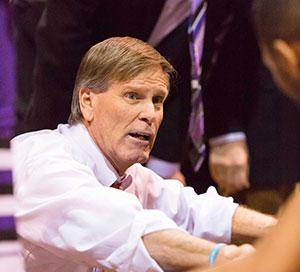
At the different games and contests, there aren’t a whole lot of students. Our biggest crowds are the townspeople. I understood we had a good student turnout the other day, which was great, because I’d like to see some of that come back. Not because it’s cheering on a sport. All right? Not because it’s cheering on basketball. Not because it’s my sport. But because they’re fun experiences to get together.
KW: Nothing’s better than a great basketball game.
DH: You said it. I just wish that we’d all start to support each other a bit more again, that’s all.
KW: What are some of your best Amherst basketball memories?
DH: In 1994, that was the first year we could go to the NCAAs and we beat Williams: we hadn’t beat Williams in forever. The gym was so packed that people were on the end line, kids on their shoulders, it was a fire marshal’s disaster. And in 2006, against Tufts, Andrew Olsen hits something called “the shot.” You can see it online. It’s absolutely phenomenal. We count it down. Olsen makes the shot. We win in overtime. Further back, I was 0 and 3 when I started coaching. We hit a buzzer-beater at Westfield State to give me my first win, and that was a young guy named Cal Malone. You never forget your first win. There are a zillion other games, but those are the ones that really stand out.
What historic event would Hix most like to see? The answer is unearthly.
KW: If you could pick three adjectives to describe what you’re like as a coach, what would you pick?
DH: Passionate. Hard-working. Demanding, in a cerebral sense, in the basketball IQ thing that we teach our kids. Smart kids who aren’t talented won’t win very much. Talented kids who aren’t very smart, they’ll win some just on their talent but they won’t win a lot. But when you put the two together, smart and talented, which Amherst can do: That’s when you start to win a lot of games.
KW: If you could do another job for one day, what would it be? This is total fantasy here, so if you want to be a professional skydiver, go for it.
DH: This will make you laugh a lot because I think, for one day, it would be the president of Amherst.
KW: Really?! Well you certainly know the place really, really well.
DH: I knew you’d laugh, as would Biddy. Tony Marx would say, “Are you out of your mind? You don’t want this.” And
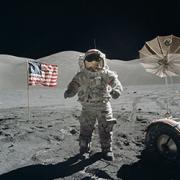
KW: All right. If you had to eat one meal for the rest of your life, what would it be?
DH: Oh, it’s got to be a filet mignon. Potatoes au gratin. And some green beans.
KW: If you could witness any historical event, what would it be?
DH: I want to be that guy linking arms, stepping onto the moon for the first time.
Amherst “is like a person to me”
KW: What basketball game would you most like to have been there for?
DH: Strangely enough I’ve been at a lot of them. I’ve been at 40 straight national championships.
KW: Amazing. Maybe one before you became a coach?
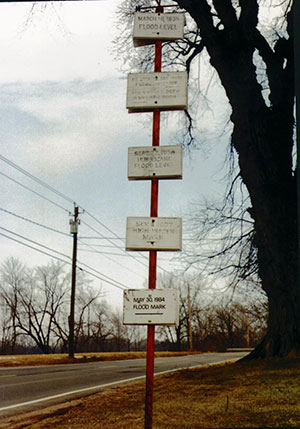
KW: What do you do on your days off?
DH: These days I go visit my mom. My parents are in Atkinson, New Hampshire, near Andover where I grew up. She’s been sick. She had cancer and it’s hard at 89, hard at any age. My wife and I do a lot of things together too, which is wonderful.
KW: What’s your favorite place in the Pioneer Valley?
DH: When you drive along Route 47, near Mitch’s Marina, and you see the signs on the telephone pole where the floodwater levels were. That fascinates the hell out of me. Then the top of Skinner Mountain, because you can see everything from there. I also love the top of Johnson Chapel. I proposed to my wife up there.
KW: What’s your favorite number and why?
DH: It was 14. I’ve always worn number 14 in basketball. When I was growing up, Bob Cousy, Oscar Robertson, great names, wore 14.
KW: So you love Don Quixote. I have to ask: do you tilt at windmills?
DH: I do. And I listen to “The Impossible Dream” from Man of La Mancha.
KW: That’s my next question. Musical tastes.
DH: I’m all over the map. I’m a little bit older school. I’m not a rap guy. As a matter of fact, the one thing that may drive me out of coaching is the pregame music.
KW: Tell me a little bit about your philosophy and experience of recruiting.
DH: Recruiting continues to change with AAU (Amateur Athletic Union travel teams) and texting and tweeting and all that stuff, right? I text but I don’t do the other stuff, and that’s OK. I think that parents are investing so much time driving their kids all over America. They want to be the agents and I don’t allow that at all. And we’ve probably lost some kids because of that. I’m a real relationship guy and so the longer I’m on the phone… Like I told one father about his son, “Hey, I spoke to Aaron the other day for a half hour.” And he goes, “You must have talked to somebody else. My son doesn’t talk for a half hour.”
But that’s the relationship that we had built and I think that lasts. It lasts them for four years. They learn to trust you when they get here. But then it goes on for years and years and years after to where the alums call and bring the kids up and the whole thing. So I think a lot of it is about building that relationship.
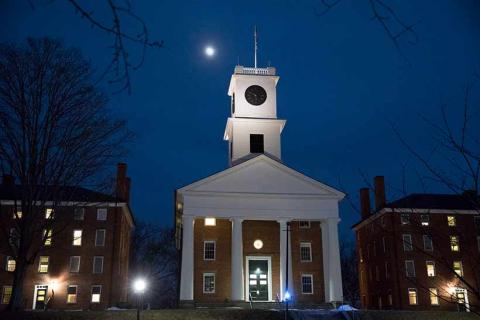
KW: Assistant Coach Adam Hutchinson ’93 says that you speak of Amherst as a person. He told me: “I don’t know if that’s a conscious thing on his part. It’s all Amherst, Amherst, Amherst. And you kind of say, ‘Who is this Amherst? I’d like to meet this person.’” What’s up with this personalizing?
DH: It’s beyond an institution for me, certainly. It’s been my life for almost 50 years now. I mean, I’ve seen it, seen it all. And I’ve just watched it grow and evolve and it’s really been fun. But it’s been like watching my brother or my sister grow and evolve. As Hutch said, I really do think that Amherst is sort of a human being for me. Not just a place.

